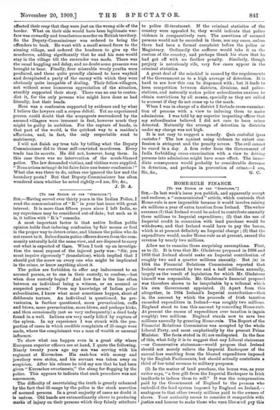[TO THE EDITOR 07 THE "SPECTATOR:]
Sra,—Having served over thirty years in the Indian Police, I read the communication of "B." in your last issue with great interest. It is more than fifteen years since I left India, so my experience may be considered out-of-date; but such as it is, it tallies with " R.'s " remarks.
A most important factor is that native Indian public opinion holds that inducing confession by fair means or foul is the proper way to detect crime, and blames the police who do not resort to it. Subordinate police officers drawn from the coin. munity naturally hold the same view, and are disposed to carry out what is expected of them. When I took up an investiga- tion the usual request of the injured party was : "Sir, you must inquire rigorously" (translation), which implied that I should put the screw on every one who might be implicated in the crime, or know anything about it.
The police are forbidden to offer any inducement to an accused person, or to one in their custody, to confess,—but when does custody begin P And how fine is the line often between an individual being a witness, or an accused or suspected person! From my knowledge of Indian police subordinates, I know what must. sometimes happen, short of deliberate torture. An individual is questioned, he pre- varicates, is further questioned, more prevarication, cuffs and blows, more prevarication, more blows, and perhaps kicks, and then occasionally (not so very unfrequently) a dead body found in a well. Indians are very easily killed by rupture of the spleen. In my experience I was struck with the pro- portion of cases in which credible complaints of ill-usage were made, where the complainant was a man of wealth or unusual influence.
To show what can happen even in a great city where European superior officers are at hand, I quote the following. Nearly twenty years ago my son was serving with his regiment at Kurrachee. His cash-box with money and jewellery were stolen, and his servant was taken away on suspicion. After his release he told my son that he had been given " Kurrachee sweetmeats," the slang for flogging by the police. This appears to indicate that such procedure was not uncommon.
The difficulty of ascertaining the truth is greatly enhanced by the fact that ill-usage by the police is the stock assertion of accused persons. In a great majority of cases no doubt it is imbrue. ' Old hands are extraordinarily clever in producing midis of injury On their persons which they falsely attribute to police ill-treatment. If the criminal statistics of the country were appealed to, they would indicate that police violence is comparatively rare. The assertions of accused persons would not be recorded in them, nor any cases, unless there had been a formal complaint before the police or Magistracy. Ordinarily the sufferer would take it as the custom of the country, and perhaps thank his stars that he had got off with no further penalty. Similarly, though perjury is notoriously rife, very few cases appear in the criminal statistics.
A great deal of the mischief is caused by the requirements of the Government as to a high average of detection. It is hard to see how this can be dispensed with ; but it leads to keen competition between districts, divisions, and police- stations, and naturally makes police subordinates anxious to obtain convictions by all means, specially as they are called to account if they do not come up to the mark.
When I was in charge of a district I forbade cross-examina- tion of persons with a view to inducing them to make admissions. I was told by my superior inspecting officer that my subordinates believed I did not care to have crime detected. Naturally the average of detection in districts under my charge was not high.
It is not easy to suggest a remedy. Quis custodiet ipsos custodes ? The law against using violence to extort con- fession is stringent and the penalty severe. The evil cannot be cured in a day. A firm order from the Government of India forbidding cross-examination with a view to driving persons into admissions might have some effect. The imme- diate consequence would probably be considerable decrease in detection, and perhaps in prevention of crime.—I am,
























































 Previous page
Previous page